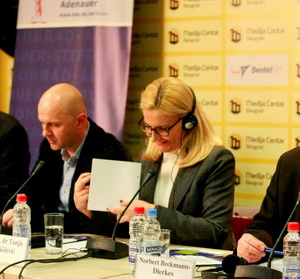 On 13 March, Tanja Miščević, the Head of the Negotiating Team for Accession of the Republic of Serbia to the EU, said that there are no new conditions regarding national minorities, that the European legislation is clear in this area, and that opened issues can only be solved with dialogue. She said that the European Commission would inform the EU member states about Serbia’s progress regarding Chapter 24 and Chapter 23, within which the Action Plan for minorities was created.
On 13 March, Tanja Miščević, the Head of the Negotiating Team for Accession of the Republic of Serbia to the EU, said that there are no new conditions regarding national minorities, that the European legislation is clear in this area, and that opened issues can only be solved with dialogue. She said that the European Commission would inform the EU member states about Serbia’s progress regarding Chapter 24 and Chapter 23, within which the Action Plan for minorities was created.
During the debate, it was concluded that the largest progress was achieved in education and the preparation of textbooks written in languages of national minorities and that providing public information in these languages is a challenge.
As she pointed out, that EU “does not create standards, rules, and regulations” and there are no documents for the rights of national minorities, apart from the Convention of Fundamental Rights, but that it “borrows” legal protection from the Council of Europe, i.e. it refers to the European Convention for the Protection of National Minorities. Ms. Miščević said that in connection with the implementation of this Convention reports are produced every two years and that according to these reports the protection of minority rights in Serbia is at a high level.
She pointed out that, in the process of drafting the Action Plan, the goal was not to create the national policy but to respond to the recommendations and eliminate the shortcomings. She reminded that the plan covers 11 areas, from education and information to protection of cultural monuments, and added that so far, two-thirds of the measures have been implemented or initiated, i.e. 67 activities were fully and 18 partially implemented.
Ms. Miščević concluded that it was easy to reach a consensus regarding textbooks and education in minority languages, but providing information in minority languages presents a challenge.
Author: M.P., taken from www.euractiv.rs
Photo: Media Centre Belgrade
 Government of the Republic of Serbia
Government of the Republic of Serbia















 pdf [271 KB]
pdf [271 KB]
Leave a Comment